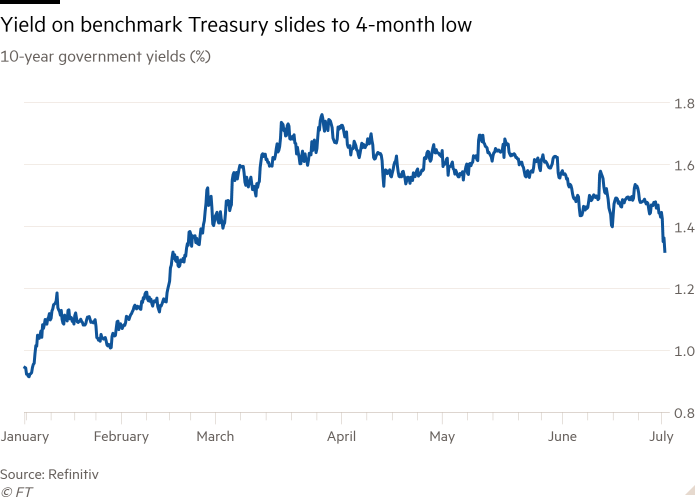US government bonds rally as traders cut bets on tighter Fed policy
US government bonds rallied on Tuesday, pushing the 10-year yield to the lowest level in four months, as investors unwound bets for tighter monetary policy and reacted to a disappointing survey on the services sector.
The yield on the benchmark 10-year note fell 0.06 percentage points to 1.36 per cent, its lowest level since late February when fears of a rapid pick-up in inflation began to reverberate through financial markets.
The 10-year yield, which moves inversely to its price, surged as high as 1.77 per cent earlier this year as investors began to anticipate a more aggressive response from the Federal Reserve to tame rising inflation.
The moves on Tuesday added fuel to a rally in long-dated US Treasuries that began on Friday, when government data showed US hiring had accelerated, but not a sufficient pace to prompt a policy shift by the central bank. The Fed’s ultra-loose monetary policies, including historically-low interest rates and a massive bond-buying programme, have been key elements in keeping borrowing costs low and lifting other asset prices.
New data published on Tuesday from the Institute for Supply Management, which tracks activity in the service sector, intensified the rush into government debt, which tends to perform well during times of heightened uncertainty. The figures showed business and employment conditions in the service industry weakened in June from the previous month, with the ISM citing company comments that it was difficult to find qualified candidates to fill open positions.

“The ISM reading just added more motivation to extend the move in Treasury yields lower,” said Ian Lyngen, an interest rate strategist at BMO Capital Markets. “A big portion of what we are seeing is a capitulation of the higher rates thesis.”
Market measures of expected future inflation in the country also slipped on Tuesday, with the so-called 10-year break-even rate declining to 2.32 per cent. Yields on other long-term Treasuries, including the 20- and 30-year bonds also fell as traders shifted into the debt. The drop pushed the difference in yields between policy-sensitive two-year notes and 10-year notes towards the lowest level since February.
The moves ricocheted to the $50tn US stock market, where shares of big industrial goods companies, oil majors and large banks slid in value. The three sectors had been buoyed this year by expectations of faster growth, with large banks also rising as investors bet higher rates would help lift earnings. The benchmark S&P 500 stocks index slid 0.7 per cent.
“As the equity market got slammed, the Treasury market caught a bid,” said Andrew Brenner, head of international fixed income at National Alliance Securities.
Investors rotated into big tech groups like Apple and Oracle — companies that have prospered during the pandemic and which are seen as less sensitive to economic fluctuations. The move helped keep losses on the Nasdaq Composite to a milder 0.1 per cent.
For all the latest Business News Click Here
For the latest news and updates, follow us on Google News.
